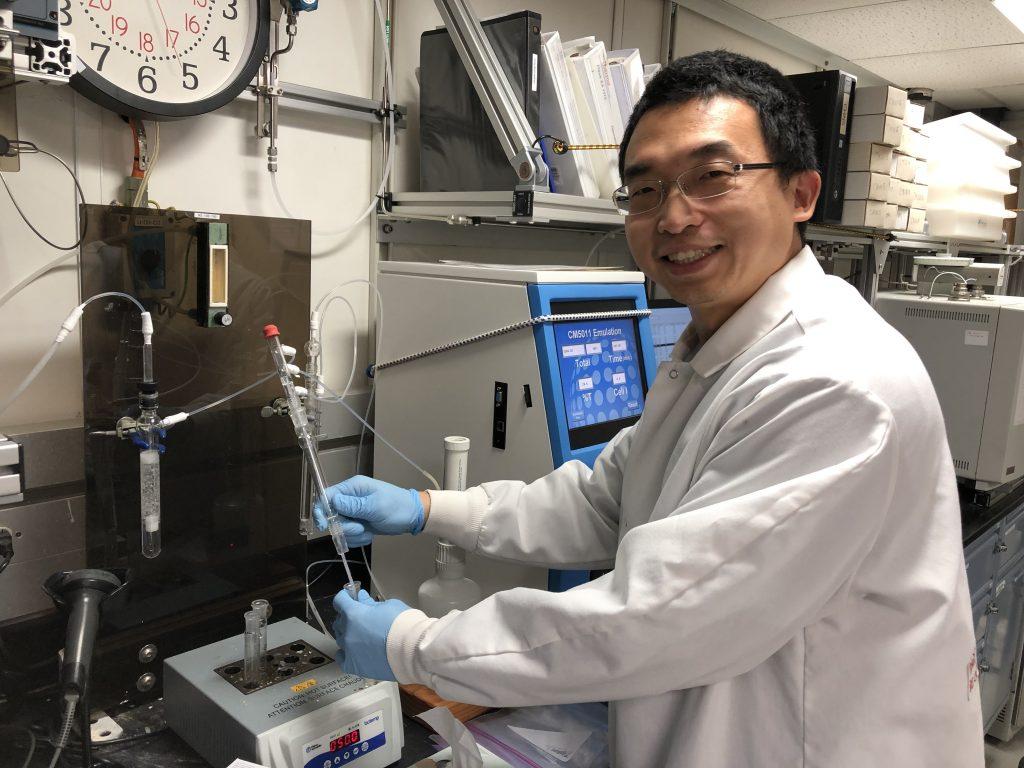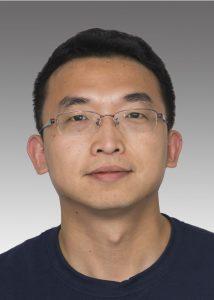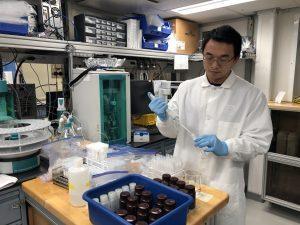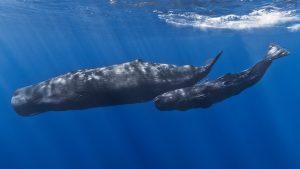
Career Spotlight: Marine Technician Chang Liu

-Worked on the JR before: Yes
Chang Liu Interview
Please describe your job duties while on the JR. What will you be doing on a daily basis?
-
-
-
-
-
-
-
-
- I manage the geochemical lab and help the scientists with their analytical work.
-
-
-
-
-
-
-
Describe one instrument or tool that is essential for you to do your job? Or a piece of equipment on the JR that is useful and why – what does it do?
-
-
-
-
-
-
-
-
- Spectral photometer. We mix certain chemicals with our water samples, and this will trigger reactions along with color changes based on the concentrations of the element we want to measure from the water sample. For example, water with high content of phosphorous will become very blue, while silica will give us a yellowish color. The spectral photometer will read the colors’ variances and calculate the percents or ppm of each element in the solution. The entire process doesn’t take long and the results are pretty reliable. For the geochemical work on JR, especially when the cores come up really fast, this instrument will save us a lot of time and yet give us what we want. I like it a lot.
-
-
-
-
-
-
-
Why is your work (or research) important? What question are you trying to answer or how does your work/research help assist/advance scientific knowledge?
- Our work and lab provides the scientific party, especially the geochemists, the resources and instruments they need to collect data while on the JR. The data helps inform us about the Earth’s past environments and what happened during the sediments depositional process. We also monitor the hydrocarbon concentration level from the drilling cores making sure we won’t drill into a petroleum reservoir which could be a threat to our safety at sea.

Why the ocean? What made you choose a career at sea or career that involves the ocean?
- Working on the ocean gives me the opportunity to isolate other distracting matters from land and keeps me concentrated on what I need do. I also have opportunities to communicate with a lot of good scientists when working on the JR.
What are you most excited about for this expedition and/or being on the JR?
- The dark day, cold weather, and the rough seas we might meet. I am also very excited to work with our geochemist team and the possible outcome from this expedition, and getting close to Point Nemo.
What are three things you think are needed for a successful expedition at sea? And Why!
- Nice people, efficient facilities, and good weather. All of them will make me happy at sea so I can accomplish my work objectives and have fun at the same time during the two months.
If you could answer one question about our Earth – what would it be and why?
- What will the climate be in the next 100 years or 1000 years? How do we face it? Answer: The best way to understand the future is to learn about the Earth’s past via the deep-sea drilling record. This is because deep sea sediments usually archive a complete and continuous record of paleoenvironmental information which we can use to understand the Earth’s history better.
What is your favorite sea creature and why?
- Whales, Sperm Whale. The sperm whale has the biggest brain and makes very loud sounds. They must be very smart.

When did you know you wanted to pursue a career in science or an ocean science career?
- After I attended my first IODP conference in Shanghai three years ago during my Ph.D. study, I was amazed by the ideas and abilities of IODP and the ocean science research. It bonds scientists from different backgrounds around the world together to accomplish very high quality research while on a drilling ship. I decided to join the team and be part of the ocean science research, and enjoy my time with them.
What do you personally hope to gain or experience while on EXP383?
- Learning more about the geochemistry lab. Also I hope to become friends with our scientists, as well as learning from their research.
What message do you have for anyone considering a career at sea or a career involving the ocean sciences?
- It is a special and interesting experience, please give it a try and I am sure you will love it.
What do you do back home when not on the JR?
- I will be traveling and visiting my family using my vacations. I will also have some projects to do with IODP in College Station.
Do you get sea sick? If yes or sometimes, please also select the other tab and describe how you cope with it.
- Yes. I will sleep a lot and eat less food (only eating crackers and soda help a lot). Sometimes I will stay outside and stare at the sea to prevent the sickness to get worse.
The need for space comes in many forms. Which type of space, in general, is the most important to you?
- ___Personal Space
- ___Creative Space
- ___Outdoor Space
- _X_Emotional Space
- ___Physical Space
- ___Spiritual or Meditative
- ___Outer Space
- ___Community Space
- ___Quite Space
- ___Productive/Work Space
- ___Digital/Virtual Space
- ___Public Space
- ___Inner Space
- ___Other:
Why that type of space? What makes it important to you and will it be available while on the JR?
My mood changes during the two months sailing and sometime I got very upset for no reasons (especially week 6). To me it is very important that I have some emotional space where I can release some of my negative thoughts while keeping the good ones, so it won’t affect others. I think the best emotional space is to talk to your friends and sharing my feelings with them, as well as seeking their opinions on certain matters. It does not have to be at a specific physical location. Anywhere on JR could be my emotional space, as long as my friend(s) and I can grab a cup of coffee or tea (not in the chemistry lab) and where we can have a good chat.